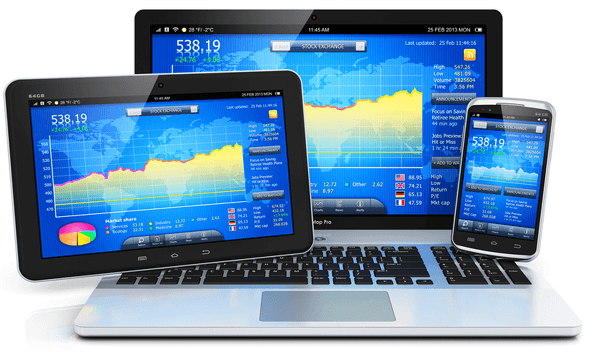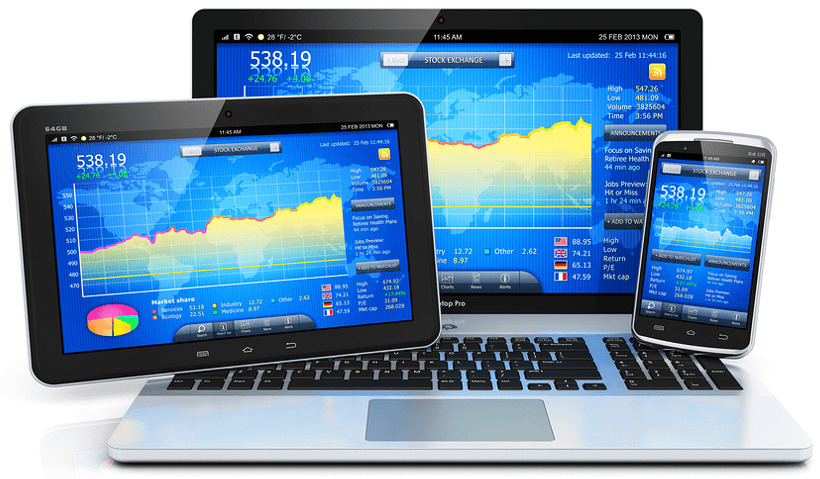Online Banking Definition – Is It Safe & What Is Internet Banking?
Are you still wondering “What is online banking?” or “What is internet banking?”
To understand and appreciate the true online banking definition, you have to look at how banking has changed over the last 20 years.
Previously, you had to go down to your bank’s local branch if you wanted to perform simple tasks like making a deposit, paying bills, or checking balances. With today’s technology, you can perform virtually every banking service from the comfort of your own home—the heart of electronic banking’s definition.
Internet banking’s definition is the ability to perform banking activities online instead of in person. Besides calling it internet banking, it is also known as online banking, web banking, and even virtual banking.
Most banks allow their customers to conduct their banking over the internet. The types of services that customers can perform online will vary between banks. A good bank will let their customers make deposits, pay bills, and do almost everything that they could do at a local branch over the internet. This is how you truly define online banking.



Image Source: Online Banking Definition
The one service you do not have online is ATM withdrawal access. Obviously, you would need an actual machine in order to conduct cash withdrawals from your bank account. When you conduct your online banking reviews of potential banks, pay attention to the ATM services they offer.
Branchless Online Banks
The internet banking definition is comprised of two types of online banking services. The first is the kind where a brick-and-mortar bank allows their customers to access their account information online instead of having to go to their bank’s local branch.
To really define online banking, you have to look at the second type of online banking, banks that are based exclusively over the internet. This means they don’t have any local branches or a place where you can go in person to talk with a banking representative. Instead, all you have is a customer service phone number and email address to contact the bank with.
Both types of online banking services are considered part of the digital banking definition. But most people prefer to have a bank with both online and in-person services. That way if there is a big problem with their bank account, they can easily go down to their branch and talk to someone in person.
If you have a strictly online bank, then you don’t have that luxury. You also don’t have the luxury of having your bank-affiliated ATM near you. But to really define online-only banking, you have to look at all of the benefits these banks offer their customers.
All-in-One Change Management Tools
Top Rated Toolkit for Change Managers.
Get Your Change Management Tool Today...
The Benefits of Online Banks
Despite the worries you may have about online banks, there are numerous benefits you should know about. Researching e banking and its definition may have shown you some, but others you may not be aware of. Here is a breakdown of the benefits you should expect from opening up an online bank account:
- Convenience – Online banking brings all kinds of convenience to your banking experience. You can access your bank account information from anywhere with a computer and internet connection. Online banking is also available 24 hours a day, 7 days a week. This flexibility with time is one of the best things about internet banking.
This means you don’t have to wait for some local branch of your bank to be open during business hours to do your banking. You can do it anytime of the day or night, which is especially helpful for people who have busy work schedules and are not available to go to a local bank during daytime hours.
- Better Interest Rates – Great deals on interest rates are also linked to internet banking. Online banks typically pay much higher interest rates when you place money in an online savings account. Other accounts you can open which pay high interest rates include high-yield checking accounts and CDs.
Online banks also offer you lower interest rates on loans and mortgages. Online banks don’t have the same high overhead and infrastructure expenses that physical banks do, which allows them to be more generous with their interest rates, which is attractive to potential customers.
- Additional Services – Physical banks may offer basic online banking features, which puts it under the umbrella of online banking’s definition. But online banks typically offer more comprehensive features like tools for budgeting, forecasting, investment analysis, financial planning, equity trading platforms, and loan calculators. Some online banks even offer online tax preparation services.
- Mobility – We now live in a virtually mobile society. Everywhere you look, people have out their smartphones to perform a variety of tasks to benefit their daily lives.
Whether it’s through a banking app or just from visiting the bank’s website on your mobile browser, you can always stay connected to your bank account no matter where you are. Mobility should always be a factor when you conduct your online banking review of a particular bank.
- Easy Setup – Opening up an online bank account is very easy and does not take long at all. Most online banks will just have you fill out an online application form and then click “submit.” Some banks may even approve you automatically after submitting the form if the information checks out. Other banks will make you wait for a physical person to review your information.
- Bill Pay – You cannot look at online banking and its definition without including bill pay. Everyone has bills to pay. In the old days, people would have to write checks each month to all the companies they owed money to—the power company, landlord, water company, and so on.
Online banking eliminates this hassle by allowing you to set up a bill pay feature where your bank automatically sends funds to the people you pay on a regular basis. That way you never have to worry about forgetting to write the check and make the payment to them, which eliminates the chances of late payments. To define online banking fully, you must mention bill pay.
Don’t Miss: What Is Debt Consolidation? – Is It Good or Bad? (Ways to Consolidate & Explanation)



Is Online Banking Safe?
If you’re not a millennial and come from an older generation, you might have concerns about the safety of online banking. You’ve probably asked yourself, “Is online banking safe?” The quick answer to this question is “yes!”
Millions of people around the world take part in online banking and don’t really ponder “Is online banking safe?” Instead, they just use their online banking as if it were the most natural thing in the world.



Image Source: Is Online Banking Safe?
Online banks have the same level of risk as traditional banks do. Today, files are kept on secured computer databases, which means the risk of opening up a bank account is the same no matter what kind of bank it is. If online banking weren’t safe, then there wouldn’t be so many people using this service.
You will want to be careful, though, when choosing an online bank because there are a lot of fraudulent websites out there which claim to be online banks.
You know that bigger banks, like Wells Fargo and Bank of America, are legitimate because they have physical branches and are well advertised. You wouldn’t even have to conduct an online banking review on them because of their widespread popularity.
On the other hand, online banks do not have physical locations and are not that well advertised. So when you go searching for one, you have to make sure it is a legitimate online bank by doing your due diligence.
Related: What Is Brexit? – Get The Definition & Review (Britain Leaving EU?)









Here are a few ways that you can tell if the bank is legitimate or not:
- Government Regulated and Protected – For any bank to legitimately define online banking, it needs to have some kind of government protection. With American banks, account holders have FDIC insurance protection on all their deposits. This means that if their bank were to ever shut down or go broke, the account holders of the bank would be reimbursed by the government for the money they had in their account.
Your online bank must have protection like this. But don’t just take their word for it. Go to the website of the FDIC (or your country’s banking regulatory agency) and search their list of banks that carry that protection. If the online bank is listed there, then you know it is legitimate.
- Encryption Software –It is essential for any online bank to have encryption software to protect your account information when you enter it in or access it over the internet. Without this protection, your account could be susceptible to hacking, malware attacks, phishing, or any number of attacks from unauthorized people looking to steal your information.
- Security Policies – Security is a big part of the true online banking definition. Make sure you investigate the security policies of the online bank. You want to find out what they will do in the event of a security breach in order to protect your information or to get reimbursed for any damage caused by an attacker.
- Identity Theft Protection – More banks these days are offering identify theft protection and insurance for account holders in case their account information gets stolen and used for fraudulent purposes by an identity thief. This kind of protection doesn’t just come with your account, though; you have to purchase it as an extra service for a low monthly fee. But it may be worth having this protection with an online bank, especially if you are new to online banking.
- Reviews – A quick way to check the legitimacy of a bank is to search for an online banking review of that bank. This will give you the chance to read reviews from other customers who’ve tried those online banking services. If the reviews are good, then chances are you can trust that bank.
Popular Article: What Is a Decent Credit Score? Get All the Facts! (What Is Bad Credit?)
Free Wealth & Finance Software - Get Yours Now ►
Conclusion
Hopefully, you now understand the electronic banking definition and can make an educated decision when it comes to your banking needs. But to really get a grasp of the true e banking definition, you must experience internet banking for yourself.
The best way to go about this is to have one bank account at a physical bank and one bank account at an internet bank. Keep the majority of your money in the physical bank and put some money in the online bank to test it out and get comfortable with it. Just make sure you have conducted an online banking review prior to opening an account.
If the online bank is to your liking, then perhaps you can place more money into it and use it for more of your banking needs. Online banking doesn’t limit people from still having physical bank accounts, though; any combination is fine. It’s all about finding the right banking mix that meets your needs.
Read More: What Is Investment Banking? – What You Want to Know! (Definition, Types, & Basics)
AdvisoryHQ (AHQ) Disclaimer:
Reasonable efforts have been made by AdvisoryHQ to present accurate information, however all info is presented without warranty. Review AdvisoryHQ’s Terms for details. Also review each firm’s site for the most updated data, rates and info.
Note: Firms and products, including the one(s) reviewed above, may be AdvisoryHQ's affiliates. Click to view AdvisoryHQ's advertiser disclosures.





